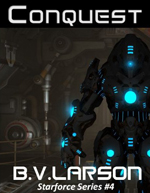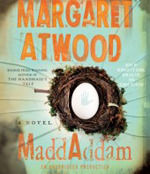
 Conquest – (Star Force #4)
Conquest – (Star Force #4)
By B.V. Larson, Performed by Mark Boyett
Publisher: Brilliance Audio
[UNABRIDGED] – 12 hoursThemes: / aliens / military sci-fi / fighting bugs / machines / invasion /
Publisher summary:
Conquest is the next chapter in the great interstellar war between all living creatures and the machines. Star Force must stop the machine invaders once again – but how? In the fourth book of the Star Force series, Kyle Riggs has freed Earth from the chains of the Macros – but at what cost? The Macros no longer trust him. He is a mad dog that must be put down – and all Star Force must be stamped out with him. The war expands in this story, and mankind is once again faced with annihilation.
Conquest is the fourth book in the Star Force series by B. V. Larson and, while it continues the well-established tradition of this series for thrilling military action, it also brings several of the flaws of the series into sharp focus.
Over the course of the previous three novels in the Star Force series, Kyle Riggs has made some bad calls. He has sworn Earth to provide troops for a dangerous enemy, ordered thousands of his troops to their deaths, and cast aside strategic alliances with little thought to the long-term consequences of his actions. Throughout it all, I continued to root for Riggs and the rest of his band, even as I questioned his actions. Now, though, I can’t help but wonder if Star Force is the right team for the job.
Of course, they never were supposed to be the first best choice. Riggs and Crow, the co-leaders of Star Force, were plucked from their homes by brutal machines and only came to command the most technologically advanced army in human history because they managed to survive a brutal series of tests, so it should come as little surprise that these two often resort to brute force to solve their problems. Still, I couldn’t help feeling that these two men were woefully unfit for command when the first few chapters of this book consisted of little more than a super-powered grudge match between them. Riggs, as the narrator and protagonist, does his best to justify his actions to the reader, but many of his arguments can be boiled down to, “I did my best, but I’m not really a soldier.” Meanwhile, Crow is written as a chameleon who repeatedly vacillates between careless pirate and brilliant strategist, with little to no transition between.
One might expect that the return of the giant Macro robots would bring some unity to Star Force, or at least some sound strategic planning, but it doesn’t. Instead, Crow runs away (as usual) and Riggs comes up with some brilliant modifications to the Star Force battle equipment, then fails to use them to their potential (as usual). The one piece of brilliant strategizing that Riggs does manage to pull off, which results in the Macros focusing their attacks on Star Force’s home base rather than assaulting the entire planet, backfires spectacularly when he forgets the lessons learned in his previous fights against both the Macros and the Helios Worms. Riggs knows the Macros are underground, but makes no plans to defend against an attack from below. He gives his troops the ability to fly, but rarely uses that to his strategic advantage. Mistake compounds mistake until only nuclear weapons and convenient force-field failures can save Earth.
Apparently I am not the only one dissatisfied with the leadership of Kyle Riggs, as the author included a subplot of ongoing assassination attempts in Conquest. Obviously, I won’t say who or what was behind the attempts, but I like to imagine that there was some level of symbolism to B. V. Larson’s decision to introduce this plot element. I have to wonder if maybe there is some chance that, by the time he reached this book, Larson had realized that Riggs needs to develop further as a leader and a character.
Mark Boyett does an admirable job narrating this series, navigating the wide range of accents with ease. I did think, as I listened, that I caught a few errors, but I am more inclined to believe that these were missed during the editing of the book, rather than introduced in the recording of the audio. At a running time of just over eleven hours, spanning ten CDs, the book is just long enough to tell the story of the second invasion of Earth without overstaying its welcome. I plan to continue reading this series, but I truly hope to see some growth in strategic thinking from Riggs, or I could see myself beginning to feel sympathetic towards Conquest’s failed assassins.
Posted by Andrew Linke
 MaddAddam (MaddAddam #3)
MaddAddam (MaddAddam #3) Doctor Sleep (The Shining #2)
Doctor Sleep (The Shining #2) Emperor Mollusk versus The Sinister Brain
Emperor Mollusk versus The Sinister Brain

